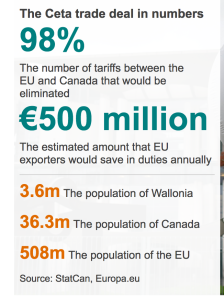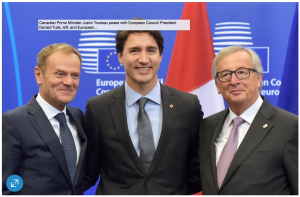Where in the world is Wallonia? That’s a serious question. Do you know the answer? I’ll admit I didn’t. Not until I read about how a tiny agricultural region in Belgium that threw the brakes on a major European Union trade agreement with Canada. So how did a small region from a very small country disrupt a major economic policy agreement?
To begin, the treaty is entitled Ceta which stands for Comprehensive Economic and Trade Agreement, and it aims to do what trade deals always do: lift restrictions on economic activity between Canada and the EU. The European commission claims that, “It will lift 99% of custom duties and many other obstacles for business.” The commission also mentions specifically that this deal will, “fully uphold Euorpe’s standards in areas such as food safety and worker’s rights.” An important point for Wallonia.
Ceta has been in the works for nearly seven years. A long negotiation to be sure, but why was it so difficult? When dealing with the EU one would think that you are negotiating with one major political entity, but in this instance it was more like trying to negotiate with all 28 member states at one time. That’s because in this deal the EU granted veto power to every single member state. So if you couldn’t convince everyone to agree on this deal, then you might as well have convinced no one.
Enter the French speaking Belgian parliamentary region of Wallonia. A place that represents the voices of a mere 3.6 million people, which is a tiny number when compared to the number of people whose lives would be affected by the passage of Ceta. It has influence because Belgium has a system that prohibits a singular central government from signing these treaties for itself. The government is comprised of six separate parliaments that each represent different geographic or linguistic division within the country, and each gets a veto on any trade deal signed by the Belgians. So the Flemish parliament gets a vote, the Brussels-centered Parliament gets a say and one vote says the Wallonians can stop the whole deal.
So in this instance, the Canadians aren’t just dealing with the EU, they’re dealing with Belgium, because Belgium can torpedo the whole deal, and to convince Belgium they have to work with, you guessed it, Wallonia led by Minister-President Paul Magnette. But why did Wallonia want to stop a major trade deal? Because their major industry is agriculture, and their socialist political leadership wanted to put up a fight to protect their constituents from facing cheaper agricultural goods coming in from Canada. The classic protectionist political story that we’ve seen since the British Corn Laws. The Wallonia parliament also strove for stronger safeguards on labor, environmental and consumer standards.
So what did this all amount to? A four-page addendum to a 1,600-page trade agreement. Kind of a let down. The Walloons celebrated the concession they grabbed as a major victory. Basically, what they got was special court system to determine if investor-state tribunals are compatible with EU Law and a guarantee that the Belgian government can assess the socio-economic impact of Ceta. What the Walloon government really won was political influence. They used anti-globalization sentiment around Europe, and leveraged it in order to say they were protecting the workers.
However, the deal still went through, and it is the first major trade agreement signed by the EU with an industrialized nation. The EU leadership and Canadian Prime Minister signed the deal into provisional action earlier this week, and now it must go up for full ratification with the more than 30 national and regional parliaments that make up the EU. So Wallonia didn’t manage to stop global trade, but it does show worrying signs for those trying to consecrate trade agreements with the EU. Countries like the US and post-Brexit Britain will certainly take note.


Leave a Reply
You must be logged in to post a comment.